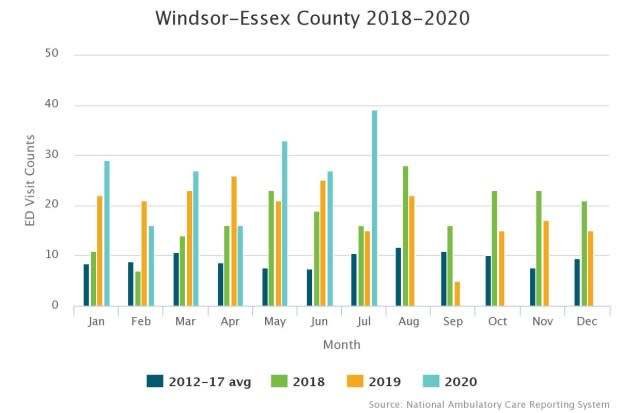Drop in Windsor distribution of life-saving naloxone kits during pandemic
The number of life-saving naloxone kits being distributed in Windsor has seen a significant drop since the COVID-19 pandemic began in March, while overdose-related emergency department visits — and deaths — appear to be increasing.
Tara Gomes, a professor of epidemiology at the University of Toronto, is one of the researchers behind the first-ever study to track naloxone distribution in the province by geographic location.
The study estimates the availability of naloxone, dispensed primarily by pharmacies, has lowered the rate of opioid-related deaths by anywhere from a quarter to half ever since free kits were introduced by the Ontario government in June of 2016.
"In the Windsor area, what we found was that the number of kits that was being dispensed every month has dropped by about half since the COVID-19 pandemic," said Gomes.
About 350 naloxone kits were dispensed every month in Windsor before the pandemic, said Gomes. That number dropped to about 175 in the last few months.
Gomes said these numbers are alarming, since there appears to be an increase in opioid-related deaths in the region.
Forty-seven people died from drug overdoses in Windsor-Essex in 2019. Through the first four months of 2020, there are 19 confirmed deaths.

"We know that the advice during the pandemic is for people to stay home and not move about as much as they have in the past. So, it's likely people are not going to the pharmacy as often," said Gomes.
"One of the real concerns are people are more isolated, so they're using drugs more alone. So they might not even be in a circumstance where naloxone can be administered because you need somebody there to administer it."
Wale Aderinto, a pharmacist and owner of Erie Health and Wellness Pharmacy in Windsor, has seen a decrease in demand at his pharmacy.
He believes it could be a result of the societal shift in focus from the dangers of the opioid crisis to the dangers of COVID-19, which may have reduced the public's awareness of the kits.

"It's important not to lose sight of the dangers posed by overdose and the role that naloxone kits can play in saving lives," said Aderinto.
Aderinto said it's more important than ever to have a kit at your disposal since people are isolated and dealing with the pandemic, making them more vulnerable to overdosing.
Ontario's coroner has already reported a 25 per cent surge in the number of opioid-related deaths since the coronavirus pandemic began, thanks to a combination of increasingly toxic street drugs and pandemic restrictions placed upon outreach workers.
The study suggests only 56 per cent of pharmacies in Ontario carry the free kits and Gomes believes, given how common opioid-based painkillers are whether supplied by a doctor or on the street, more should be done to maximize the reach of the life-saving drug so that naloxone might one day be as common as a first aid kit.
Spike in opioid-related ED visits
The Windsor-Essex County Health Unit has warned of some of the dangers of self-isolating for those dealing with substance abuse.
There have been upticks in emergency department visits due to opioids, with most months of 2020 reporting greater numbers year-over-year. During one two-day span in July alone, there were nine overdose cases, all involving fentanyl.

Last month, the health unit, along with partners involved in the Windsor-Essex Community Opioid and Substance Strategy, began seeking expressions of interest from building owners and landlords to house a safe drug consumption site.
The Consumption and Treatment Services site would offer "wrap-around" services including counselling, primary care, opioid-dependency treatment and other health services as well as being a safe place for people to consume their substances.


